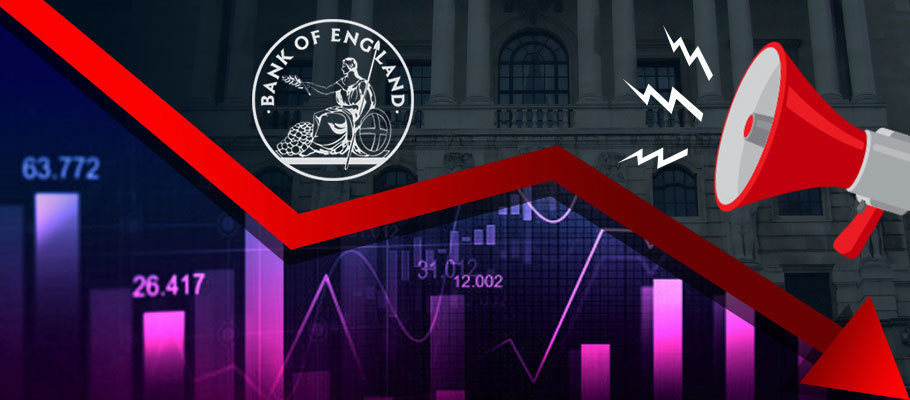
Published: September 22th, 2020
After a spark of activity in the stock markets that was ignited by the positive retail spending data coming out of China, markets are slumped again on Friday, September 18. The decline followed a Bank of England (BoE) rate announcement.
The Bank of England (BoE) on Thursday, September 17, gave the clearest indication yet that it might cut the interest rates below zero. If it goes ahead with the suggestion, it will be the first time in its history. The consideration is prompted by the surging cases of coronavirus infections and the impact of the disease’s spread on the economy. The risk of a no-deal Brexit is also worth noting.
As a result of the announcement, forex trading was uneventful on Friday, September 18, and the pound fell. BoE said it will work with regulators to implement subzero rates. Andrew Bailey, the bank’s governor, said that because of the multiple threats weighing in on the economic outlook, the bank will begin structured engagement with bank regulators in the U.K. to implement negative rates, as and when necessary.
The governor’s assertions are included in the minutes of the latest policy decision meeting. The memo sent the markets to bet that the next 10 basis points of easing may come as early as February 2021 with another cut of a similar magnitude coming in the summer.
The comments weakened the pound by 0.7% sending it slumping to $1.2876.
The U.K. is trudging into the last quarter of the year fighting a resurgence of coronavirus infections. The reemergence of the disease has led to local, fresh social restrictions to curb the spread. And, there are fears that unemployment might increase when the government withdraws support for wages next month.
Another issue that might fan the flame of economic turmoil is Prime Minister Boris Johnson’s threat to redraft the Brexit agreement with the European Union. Such attempts could wreck any chances of a trade accord before the deadline of December 31.
Before the policy meeting, economists were foreseeing a situation where bond purchases could expand by £50 billion (Approx. $64.5 billion) in November. The same forecasts gave room for zero-rating of interest rates in Q1 of 2021.
For now, BoE has set its benchmark rate at 0.1% while the bond-buying program is at £745 billion. Jeremy Stretch, head of G10 currency research at Canada Imperial Bank of Commerce, said the many options the bank has brought to the table are due to the high uncertainty the economy is facing.
Jeremy expects quantitative easing to be the bank’s first option to handle heightened uncertainty. However, he is almost sure that BoE will enforce negative rates to offset any eventualities from a no-deal Brexit.
Dan Hanson, a senior economist for the U.K. at Bloomberg, said that BoE came out of the September policy meeting with several open options but there is no sure indication that additional easing is coming. However, the emphasis that the minutes put on the risks, especially about the labor markets, meant that the possibility of more stimulus was firmly on the table, Dan added.
The new BoE stance is seen as an about-turn according to market experts. Just last month, the bank’s governor warned that taking interest rates to the subzero region could damage the country’s financial system and the entire economy by extension.
This remark explains why the banks, aside from proposing to go full throttle with its subzero interest rates, also want to consider a possible way out in conjunction with the Prudential Regulatory Authority. In the Monetary Policy Report for August, the bank reiterated that the impacts of the coronavirus pandemic translate to loan losses for banks, especially if unemployment rates rise and businesses continue collapsing.
Because of such impacts, a subzero interest rate policy might be less effective in jumpstarting the economy now. However, the strategy might prove helpful when banks’ balance sheets start improving, the bank’s governor announced.
The bank’s officials said that even though recent data indicates a slightly stronger economy than expected, the risk of a lasting period of increased unemployment compared to previous forecasts lingers. Overall, the projected contraction for Q3 has been revised to 7% compared to Q4 2019, a slight improvement from an earlier estimate of 8.6%.
The good news is that BoE’s committee has its eyes on the situation and is ready to revise or adjust the monetary policies in place as is necessary, the bank’s report said.
BoE is not the only central bank with persistent problems. Earlier, before the announcement, the Bank of Japan and the Federal Reserve both resolved to leave their rates unchanged. Moreover, Britain is not the only country struggling with low inflation.
The U.K.’s inflation is currently at 0.2%, which almost mirrors what is happening in the U.S. A day before the BoE announcement, Federal Reserve chair, Jerome Powell, while outlining steps to keep interest rates near zero for the whole of 2023, complained of the U.S.’s inflation running perseveringly low.
These figures are a reflection of the markets. On Friday, September 18, the pound traded on average 0.36% down against the dollar and 0.25% against the euro. It did considerably worse against the yen, trading at 0.68% down.
The British stocks, on the other hand, did relatively well, albeit slightly, possibly buoyed by a weak pound. The FTSE 100 declined but only by 0.19%, which is a considerably better performance compared to the 0.75% drop that the Euro STOXX 600 recorded.
The weakening pound also dragged with it the yield on the six-month U.K. bond. The bill inked a record low after BoE made public the possibilities of subzero rates.
The persistent economic hardship in the U.K. has pushed the Bank of England to reveal that it is considering dropping the interest rates to subzero. Though the current rates remain at 0.1%, the bank foresees situations that may push it lower them to keep the economy alive. The announcement pushed the forex markets lower with most currencies declining.